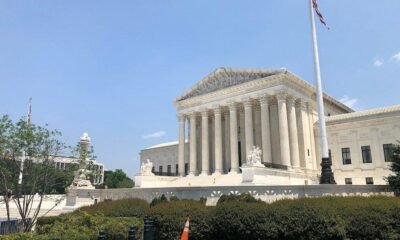arizona
Democrats Forge Path for Post-Biden Era: New Nomination Rules Unveiled

In a significant political development this weekend, President Joe Biden announced he will not pursue a second term. Vice President Kamala Harris is now positioned as the de facto Democratic nominee to contend against GOP candidate Donald Trump this November.
With the Democratic National Convention in Chicago just weeks away, Harris faces the daunting task of swiftly securing her party’s nomination and initiating her presidential campaign. Following Biden’s withdrawal, he endorsed Harris, with support also coming from all 50 Democratic state party chairs, ex-House Speaker Nancy Pelosi, and key political figures such as California Governor Gavin Newsom and Pennsylvania Governor Josh Shapiro.
Harris has yet to announce a running mate, though potential candidates include Kentucky Governor Andy Beshear, North Carolina Governor Roy Cooper, and Illinois Governor J.B. Pritzker. To clinch the Democratic nomination, Harris needs a majority of the 4,699 delegates, which translates to about 1,976 votes. An informal tally by The Associated Press indicates that Harris has the backing of 3,284 delegates, leaving only 39 delegates presently undecided.
The Democratic National Committee’s Rules Committee convened Wednesday to schedule the procedure for delegate voting, a pivotal step in confirming Harris’s nomination or considering other potential candidates. The last time either the Democratic or Republican parties held an open convention was in 1952, underlining the extraordinary nature of the current situation.
Candidates aspiring to run against Harris must declare their candidacy by 6 p.m. on July 27 and demonstrate they meet important qualifications by July 30. These include declaring their candidacy, meeting party and legal standards to be president, and gathering 300 delegate signatures, with no more than 50 from any single state.
The number of qualifying candidates will influence whether virtual voting begins on August 1 or August 3. If only one candidate qualifies, voting will start on August 1; if multiple candidates qualify, the voting will start on August 3. In the first round, a candidate must secure a majority of the 3,949 pledged delegates, equating to 1,976 votes. Should the process extend to a second round, 747 additional “superdelegates” enter the fray, necessitating a majority of 2,351 votes for nomination.
Questions arose during the committee meeting regarding previous pledges made by delegates to vote for Biden. Pat Moore, the DNC’s legal counsel, clarified that such pledges allow delegates to “vote their conscience,” freeing them to support any nominee.
The committee underscored the urgency of nominating candidates by August 7 to comply with Ohio’s ballot requirements. Emphasizing the importance of meeting this deadline, Moore pointed to potential legal challenges from Republicans following Biden’s withdrawal. “Republicans will do what they do, sue,” Moore stated, naming likely litigators such as House Speaker Mike Johnson and the Heritage Foundation.
Democratic National Convention Committee Chair Minyon Moore praised the committee’s strategic measures, expressing confidence in their ability to withstand GOP-led legal attacks. “We are confident that the process we’ve laid out is secure, democratic, and critical to our defense against bad-faith litigation,” Moore asserted.
He cautioned that without meticulous preparation, the party could face legal turmoil akin to the 2020 election challenges alleging fraud. “Trump and Republicans will challenge the results if we aren’t careful. Our mission is too important,” Moore concluded.


















